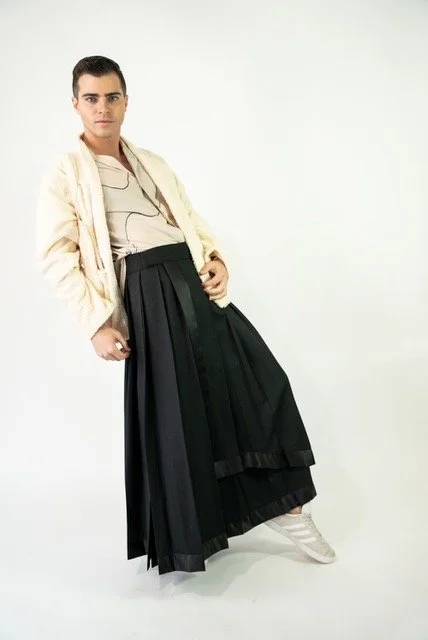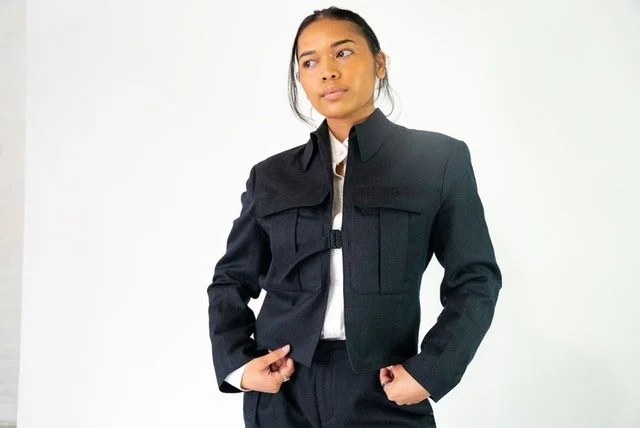WHEN YOU CAN’T ALWAYS SEW FOR WHAT YOU STAND FOR
By: Hillary LeBlanc
Values and ethics go hand-in-hand in the workplace and should be of concern to both small and big business owners because accountability has become a critical part of the customer experience. However, this can be a challenge when you work in the world of fashion where you encounter a myriad of people from different cultures, different educational backgrounds and vastly different world-view lenses. So how does one navigate the fashion industry with their ethical and moral compass intact?
Jack Sivan is a fashion designer based in Brooklyn, specializing as a tailor for other brands. Sivan understands this dilemma all too well. Sivan is a sewer and tailor for some prolific brands that we see on the roster each season at New York Fashion Week, particularly those who centre around sustainability, a value that he genuinely believes in. However, Sivan has found that on occasion he has to set aside his own morals and beliefs around sustainability when working with brands. Unfortunately the reality of fashion week and being a working artist does often require workers to accept the ways of bigger brands and companies. Sivan shares with us how he has tried to implement change where he can and how he has tried to set aside those feelings of guilt when he sees brands disregarding moving toward any sustainability efforts.
He started his career with a few internships and entry level jobs, which led to him working with bigger names through the connections he established. Lately, he has been working very closely with designer Terry Singh. Sivan met Singh while interning for a retail job. “He was beginning to develop ideas for a brand and we connected as he was looking for someone with the formal design and sewing experience to help develop his concepts”. Sivan later started working with Melke, who has recently shown at New York Fashion Week and Sans Gene through college connections, “Classmates of mine who worked for those labels reached out to me when the label needed someone on their team in a role they thought I could fit.”
For Sivan, sustainability, which he points out is a ”big vague word” has always been important to him for” all the regular reasons that breathable air and non-acidic oceans are important to people”. Sivan adds, “In the realm of fashion design I think the importance of strongly considering the impact of production, wear, and eventual reuse or disposal should be the baseline for good design. After all, if the primary impact of a garment is the garbage that’s made as a byproduct of its manufacturing, and the length of time it lays in a landfill, and that garment isn’t even worn and loved for very long, then whoever designed it hasn’t done much more than contribute more garbage to the world. Obviously smart ecological decisions are bigger than any one person, but designers, being at the very front end of the garment making process, have a lot of power to start that process of right”.
While Sivan is lucky to be working with designers who do “place sustainability as a priority in their development”, he also works with some who “don’t consider impact that much”. Sivan notes that, “this is frustrating when dealing with larger brands that I’ve worked for in the past, ones which have larger scale production, which means larger impacts. Smaller brands and luxury brands (if they don’t consider sustainability important) tend to excuse their business development with a mentality that they’re not big enough for their product to have an effect. Obviously this is a bad excuse and completely misses the point. Since I’m not in charge of those brands I can’t tell them what to do, but when given the chance I’ll advocate for product lines that at least focus on natural/low impact fibers and more long lasting, meaning either less trend focused, or simply more durably constructed items”.
Sivan feels that not only is there a long journey toward better sustainability efforts, but also workers being properly compensated. “One of the main ways cheaply made clothing has been able to thrive is because brands have taken advantage of the desperation of a lot of workers around the globe to pay them little to make things badly, so that we can buy them cheaply. Currently, there is no clear or legal definition on what “sustainability” means in the context of fashion, it really is a spectrum. All monetary incentives in fashion production point to cheap material and cheap labour as the best bet for brands. Since there’s no punishment for doing so and no punishment for telling people you’re not, brands have no incentive to behave properly. Maybe over time my generation of designers and buyers will supplant the previous ones and as a whole will care more about sustainability, but that could take time we don’t have, and isn’t a sure thing. The clear first step to changing the system is for the government to remove the monetary incentive to behave badly. Brands should get their product banned for using slave labour, textiles made from petroleum byproducts should be heavily taxed, and brands which lie about what they make should be fined heavily”.
Sivan hopes to find time to work on his personal designs moving forward, expanding the bespoke work he does for a handful of clients and continuing to work with and elevate the aforementioned brands he sews for.




